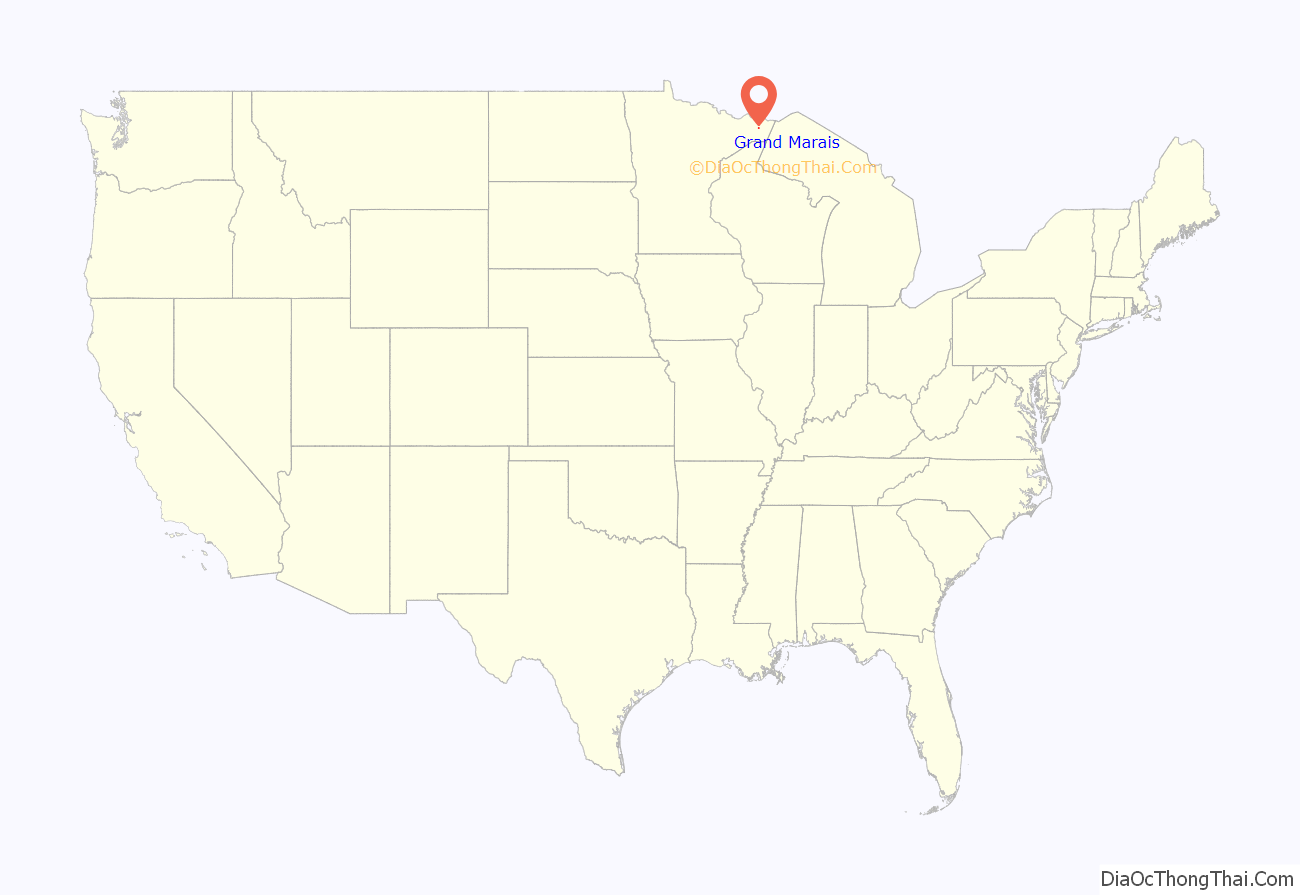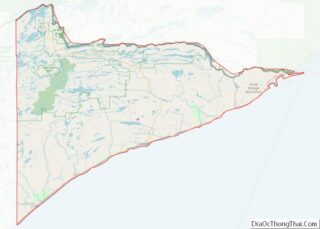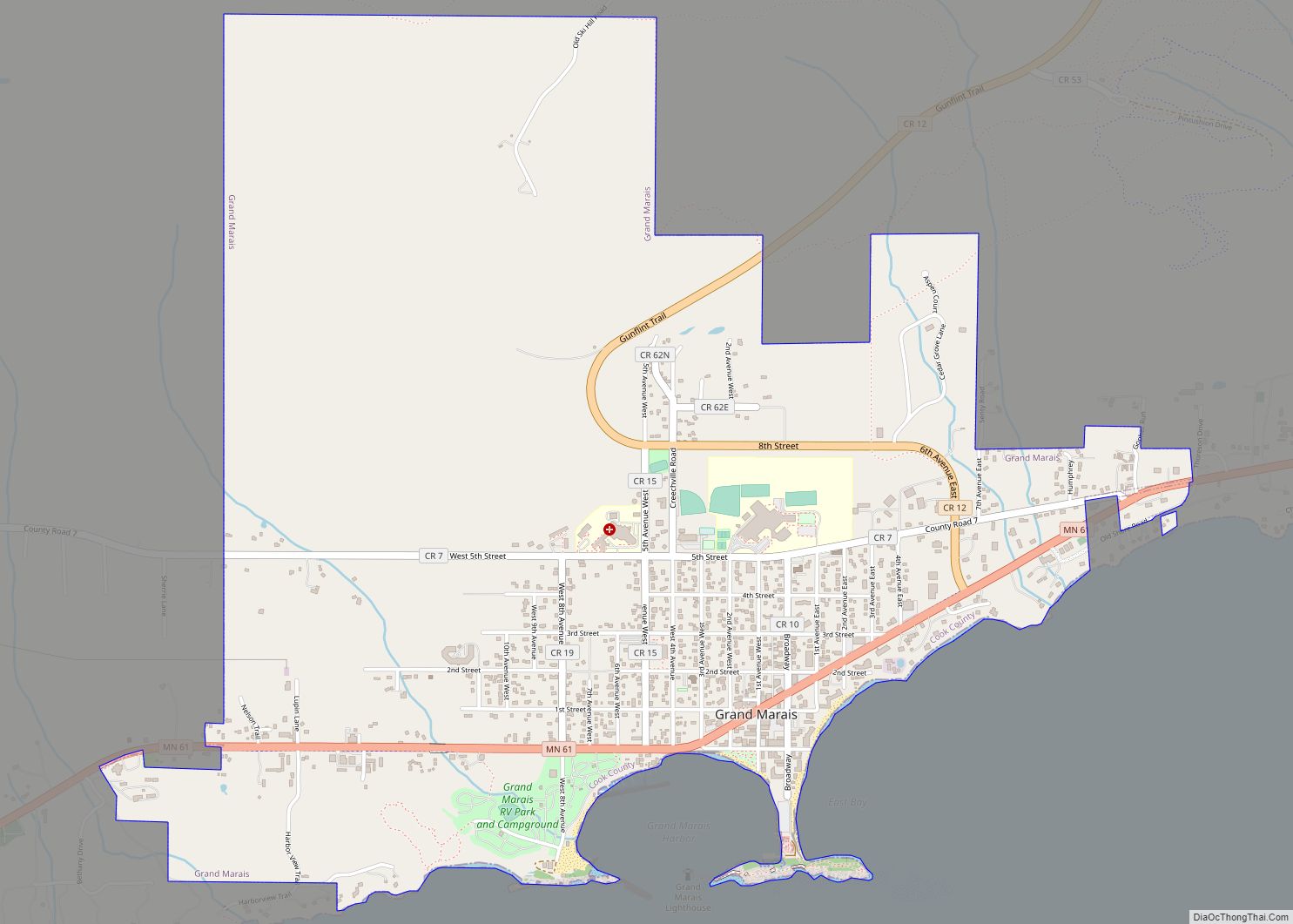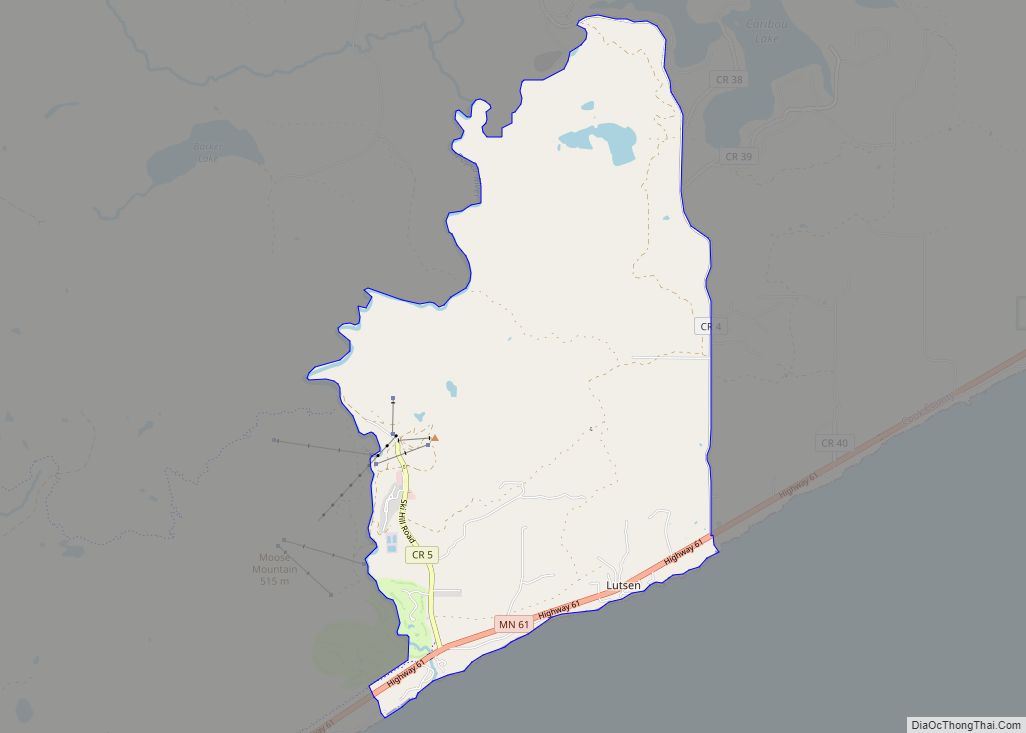Grand Marais (/ˌɡrænd məˈreɪ/ GRAND mə-RAY) is a city and the county seat of Cook County, Minnesota, United States, of which it is the only municipality. It is on Lake Superior’s North Shore. Grand Marais had a population of 1,337 at the 2020 census. Before it was settled by French Canadians and before Minnesota’s statehood, it was inhabited by the Ojibwe.
The National Scenic Byway begins in Grand Marais and ends near the border with Ontario.
| Name: | Grand Marais city |
|---|---|
| LSAD Code: | 25 |
| LSAD Description: | city (suffix) |
| State: | Minnesota |
| County: | Cook County |
| Elevation: | 617 ft (188 m) |
| Total Area: | 2.91 sq mi (7.53 km²) |
| Land Area: | 2.91 sq mi (7.53 km²) |
| Water Area: | 0.00 sq mi (0.00 km²) |
| Total Population: | 1,337 |
| Population Density: | 459.61/sq mi (177.46/km²) |
| ZIP code: | 55604 |
| Area code: | 218 |
| FIPS code: | 2724992 |
| GNISfeature ID: | 0656425 |
| Website: | ci.grand-marais.mn.us |
Online Interactive Map
Click on ![]() to view map in "full screen" mode.
to view map in "full screen" mode.
Grand Marais location map. Where is Grand Marais city?
History
The Ojibwe name for the area is Gichi-biitoobiig, which means “great duplicate water,” “parallel body of water” or “double body of water” (like a bayou), a reference to the two bays that form this large harbor of Lake Superior.
The area was a bustling fur trading station in the 1700s, and the French Canadian Voyageurs termed the settled village “Grand Marais” (“Great Marsh”), referring to a marsh that, in early fur-trading times, was 20 acres (8.1 ha) or less in area, nearly at the level of Lake Superior, and at the head of the little bay and harbor that led to the settlement of the village there. Another small bay on the east, less protected from storms, is separated from the harbor by a slight projecting point and a short beach. “Grand Marais” also may mean “sheltered water area”, as the harbor has natural breakwall rock outcroppings, providing a natural safe harbor for early Lake Superior explorers.
The area is home to several nonprofit educational institutions, such as the Grand Marais Art Colony and the North House Folk School, and art galleries featuring the work of local and regional artists.
On April 13, 2020, a large fire swept through downtown Grand Marais, destroying three buildings: The Crooked Spoon Cafe, White Pine North, and Picnic and Pine. The fire burned for over three hours in intense winds.
Grand Marais Road Map
Grand Marais city Satellite Map
Geography
According to the United States Census Bureau, the city has an area of 2.90 square miles (7.51 km), all land. Grand Marais is on the northwestern shore of Lake Superior. It is an entry point for the Boundary Waters Canoe Area Wilderness, at the beginning of the Gunflint Trail. The Superior Hiking Trail passes near Grand Marais, and Judge C. R. Magney State Park is nearby.
The land surrounding Grand Marais slopes up to form the Sawtooth Bluff, a dramatic rock face visible from nearly any vantage point in the city. Adjacent to the bluff is Pincushion Mountain, a large bald monolith with views of Lake Superior and the inland wilderness.
Grand Marais Harbor is protected by Artist’s Point, a barrier island formed by lava that was connected to the mainland by gravel deposited by lake currents, forming a tombolo. An Arctic–alpine disjunct community survives there.
Road access to Grand Marais is by Minnesota Highway 61, which follows the shore of Lake Superior, and is known as the North Shore Scenic Drive. The Gunflint Trail (Cook County Road 12) begins in Grand Marais and heads northwest, away from the lake and into the Boundary Waters region.
Grand Marais is 110 miles (180 km) northeast of Duluth and 38 miles (61 km) southwest of the Canada–US border.
Climate
Grand Marais has a warm-summer humid continental climate (Köppen Dfb), like the rest of northern Minnesota. Because of the moderating influence of Lake Superior, summer temperatures are cooler, winter temperatures warmer, and the seasonal temperature difference is smaller than locations farther inland. With average highs of just below 70 °F (21 °C) in July and August, Grand Marais has the coolest summer temperatures of any weather station in Minnesota. The difference between the temperature of the warmest and coldest months is only 47.6 °F (26.4 °C), significantly smaller than 58.9 °F (32.7 °C), the seasonal temperature difference in Tower, about 90 miles (140 km) to the west. Despite being significantly farther north, Grand Marais lies in USDA hardiness zone 4b like Duluth and Minneapolis, with an average yearly minimum temperature of −23 °F (−31 °C).
When winds come from the south, hot temperatures can sometimes hit Grand Marais in spite of the mild summer averages. The warmest temperature recorded is 100 °F (38 °C) in July 1930. The coldest temperature measured is −35 °F (−37 °C) from 1934. Cold daytime maximums are less frequent than in Minnesota’s interior, but can still be very cold on occasion. The coldest maximum recorded is −14 °F (−26 °C) in 2013 and during the 1991 to 2020 normals the mean for the coldest maximum was 0 °F (−18 °C). The warmest overnight lows in Grand Marais were two 75 °F (24 °C) readings during the summer of 1937. On average, the warmest low of the year is 64 °F (18 °C).
See also
Map of Minnesota State and its subdivision:- Aitkin
- Anoka
- Becker
- Beltrami
- Benton
- Big Stone
- Blue Earth
- Brown
- Carlton
- Carver
- Cass
- Chippewa
- Chisago
- Clay
- Clearwater
- Cook
- Cottonwood
- Crow Wing
- Dakota
- Dodge
- Douglas
- Faribault
- Fillmore
- Freeborn
- Goodhue
- Grant
- Hennepin
- Houston
- Hubbard
- Isanti
- Itasca
- Jackson
- Kanabec
- Kandiyohi
- Kittson
- Koochiching
- Lac qui Parle
- Lake
- Lake of the Woods
- Lake Superior
- Le Sueur
- Lincoln
- Lyon
- Mahnomen
- Marshall
- Martin
- McLeod
- Meeker
- Mille Lacs
- Morrison
- Mower
- Murray
- Nicollet
- Nobles
- Norman
- Olmsted
- Otter Tail
- Pennington
- Pine
- Pipestone
- Polk
- Pope
- Ramsey
- Red Lake
- Redwood
- Renville
- Rice
- Rock
- Roseau
- Saint Louis
- Scott
- Sherburne
- Sibley
- Stearns
- Steele
- Stevens
- Swift
- Todd
- Traverse
- Wabasha
- Wadena
- Waseca
- Washington
- Watonwan
- Wilkin
- Winona
- Wright
- Yellow Medicine
- Alabama
- Alaska
- Arizona
- Arkansas
- California
- Colorado
- Connecticut
- Delaware
- District of Columbia
- Florida
- Georgia
- Hawaii
- Idaho
- Illinois
- Indiana
- Iowa
- Kansas
- Kentucky
- Louisiana
- Maine
- Maryland
- Massachusetts
- Michigan
- Minnesota
- Mississippi
- Missouri
- Montana
- Nebraska
- Nevada
- New Hampshire
- New Jersey
- New Mexico
- New York
- North Carolina
- North Dakota
- Ohio
- Oklahoma
- Oregon
- Pennsylvania
- Rhode Island
- South Carolina
- South Dakota
- Tennessee
- Texas
- Utah
- Vermont
- Virginia
- Washington
- West Virginia
- Wisconsin
- Wyoming






